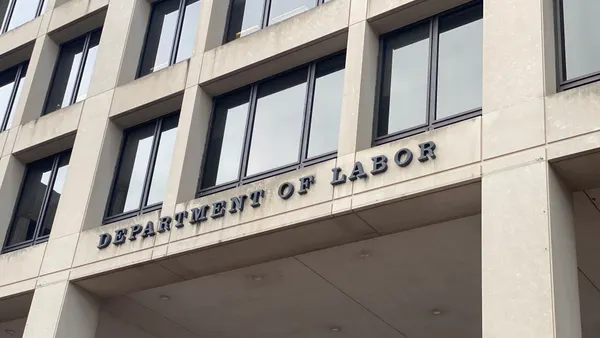WASHINGTON — Deregulation remains a priority for the U.S. Department of Labor (DOL), Secretary Alexander Acosta told attendees at a U.S. Chamber of Commerce event Wednesday — and overtime is on the docket.
"The president's regulatory agenda should be issued in the coming weeks," Acosta said. "We are just getting started — there's a lot more to do."
Acosta said the department had just completed "a couple of hearings across the nation" on overtime regulations under the Fair Labor Standards Act, with one remaining. DOL previously announced a series of listening sessions in late August, seeking public input on a rule that has been a compliance pain point for employers. Topics listed for those events included an appropriate salary threshold for overtime eligibility, DOL's methodology for determining the salary threshold and the benefits and costs of an increased threshold for both employees and employers.
DOL's most recent regulatory agenda showed the agency intends to propose a new overtime rule in January 2019.
DOL's deregulatory efforts during the Trump administration amount to a figure of $417 million in savings, according to Acosta. The labor secretary also spoke about recent updates to joint employer rules by the National Labor Relations Board, as well as updated independent contractor guidance, changes to apprenticeship requirements and President Donald Trump's expansion of association health plans.
Acosta was particularly focused on job training and apprenticeships as part of a panel discussion that included U.S. Small Business Administration Administrator Linda McMahon. DOL has changed requirements for certain grants for higher learning institutions that require them to find business partners to apply for the funds. Acosta said this change was implemented in part because of shifting business requirements and the need for school curriculums to keep up.
To support that reasoning, Acosta described a conversation he had with one senator about a community college in the senator's home state. The college's curriculum was teaching a method of welding that was no longer being used by local businesses in the area, meaning that new hires from the college had to be immediately retrained. He and McMahon both encouraged employers in the room to reach out to local educational institutions and help with curriculum development.
"We're not just talking about business and education coming together, we're requiring that business and education comes together," Acosta said. They're asking: "Are you working at the local level to ensure that education leads families to sustaining jobs?"
Similarly, the secretary talked about the need to consider changes in education. Acosta called specific attention to the construction industry: Workers are stepping up to meet the demand, he said, so much so that one academy had to turn away more than 600 applicants. "We need to tell our schools: Provide the opportunities that students want."











